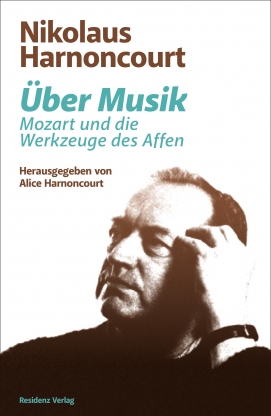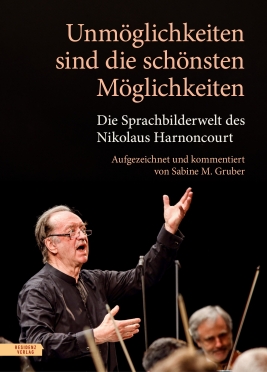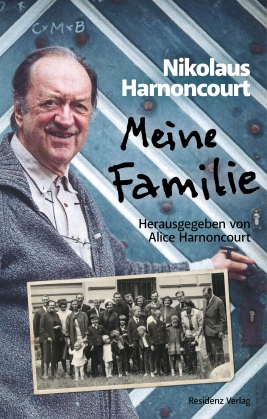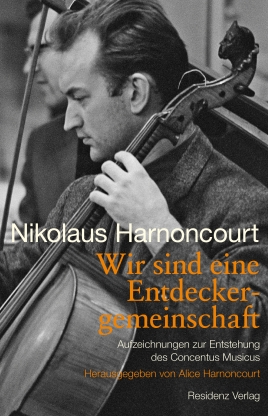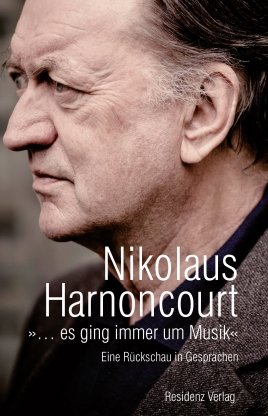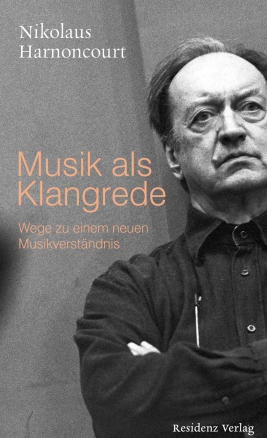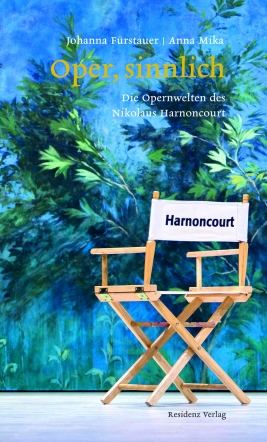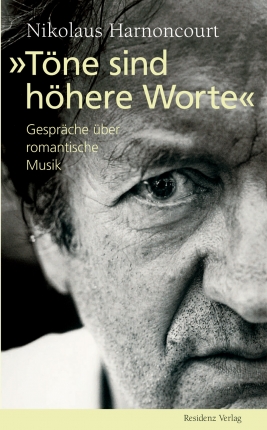Messerscharf hat Alice Harnoncourt Reden und Vorträge ausgesucht, die auch heute noch Sprengstoff besitzen, die Lust machen, auch heute noch einmal zu Nikolaus Harnoncourt zu greifen, noch einmal nachzulesen und nachzuhören.
[Quelle: Margarete Zander, DEUTSCHLANDFUNK KULTUR]
Harnoncourts Plädoyers für die Wahrheit des Uneindeutigen, für die Fortschrittsresistenz des Mysteriums, für den Mut, Widersprüche aufzudecken und sie auszuhalten, statt sie aufzulösen, reißen mit, weil sie die analytisch argumentierende Vernunft nicht über Bord werfen.
[Quelle: Jan Brachmann, FRANKFURTER ALLGEMEINE ZEITUNG]
Die Entschlossenheit und Beharrlichkeit, die Nikolaus Harnoncourt als Cellist und Dirigent ausgestrahlt hat, ist auch seinen Texten eigen. Sie haben einen unverwechselbaren Ton, sind von tiefsinnigem Humor durchzogen. Er hat gern kräftige Begriffe gewählt…
[Quelle: Raliza Nikolov, DEUTSCHLANDFUNK]
Wie ein Vermächtnis für die auf dem verderblichen Weg des Materialismus dahin taumelnde Welt, eine Botschaft, die vielleicht doch noch zur Rettung des höchsten Gutes der Menschheit, der Kultur, führen kann, lesen sich einige der Texte, die die Witwe von Nikolaus Harnoncourt, (…) in „Über Musik“ zusammengetragen hat.
[Quelle: Ingrid Wanja, OPERALOUNGE.DE]
Nikolaus Harnoncourts (…) Gelegenheitstexte aus sechzig Jahren sind frappierend einfach und tiefsinnig.
[Quelle: Erich Klein, FALTER]
Letzten Endes offenbart sich Nikolaus Harnoncourt damit auch posthum als das, was er wohl zeitlebens gewesen war: als glühender die Musik liebender pessimistischer Optimist.
[Quelle: Felix Jurecek, KRONEN ZEITUNG]
Seine Frau, die Violinistin Alice Harnoncourt, hat für den Residenz Verlag Reden und Aufsätze ihres Mannes (…) gesammelt. Was der Meister vor mehr als 20 Jahren über Begriffe wie, „Authentizität“ und „Werktreue“ schrieb, ist so erstaunlich wie visionär.
[Quelle: Susanne Zobl, NEWS]
Alice Harnoncourt ist mit der vorliegenden persönlichen Auswahl von Texten in „Über Musik“ sicher gelungen, den immer originellen und dabei ganz charmanten Provokateur Nikolaus Harnoncourt noch einmal pointiert zu Wort kommen zu lassen.
[Quelle: Daniel Knödler, DAS ORCHESTER]
Das Buch bietet eine schöne Gelegenheit zur Wiederbegegnung mit diesem funkensprühenden Streiter für das tiefere Verständnis von Musik – auch nach dessen Tod. Und für diejenigen, die Harnoncourt nicht mehr persönlich als Musiker oder Redner erleben durften, eine eindrucksvolle Einführung in sein Denken und Musizieren.
[Quelle: Robert Jungwirth, BR KLASSIK]
Seine Essays und originellen Denkweisen inspirieren und beflügeln zu neuen Einsichten über Musik.
[Quelle: Elisabeth Hell, RAIFFEISENZEITUNG]
Im Gegensatz zu den früheren Veröffentlichungen wirken die Essays dort fast wie Plaudereien und Anekdoten zum Musik-Verstehen – und sind damit auch für den gelegentlichen Konzertgeher ein toller Einstieg in die Welt dieses faszinierenden Interpretationsansatzes.
[Quelle: Christian Rupp, JOURNAL FRANKFURT]
Gedanken des großen Meisters über das Hören und Musik-Verstehen. Harnoncours kulturkritische Gedanken mehren sich in seinen älteren Schriften. Die Apelle Harnoncourts lassen einen nicht kalt. Ein umfassend gebildeter Musiker rückt mit einer klaren und leicht verständlichen Ausdrucksweise einfache Wahrheiten in den Fokus. Nicolaus Harnoncourts Schriften helfen uns dabei Musik zu verstehen, mehr noch: sie geben uns Impulse für eigenes weiterdenken.
[Quelle: Niki Keisinger, SR2]
Vernunft versus Liebe, Logik versus Fantasie – das sind die Gegensatzpaare, die Harnoncourt aufmacht. Dass die Musik ein Rätsel ist, und ein unerklärbares Geschenk aus einer anderen Welt, ist eine etwas einseitige Betrachtung der Dinge. Aber es weist hin auf sein großes Thema, das sich durch dieses ganze Buch zieht: Der fundamentale Gegensatz von Logik, einer Vernunft gesteuerten, rational bestimmten Logik und der Fantasie.
[Quelle: Rainer Pöllmann und Masche Drost, DEUTSCHLANDFUNK KULTUR]
So vehement und unmissverständlich die Herausgeberin ihre und auch seine Position vertritt, so unterhaltsam und zugänglich lesen sich die Texte (…). Herausgekommen ist kein vertrackter, musikphilosophischer Band, sondern eine bunte Sammlung grundlegender, niederschwelliger Texte über die Musik und ihre Bedeutung für die Menschheit. Kurzweiliger kann Musikkunde kaum vonstattengehen.
[Quelle: Judith Hoffmann, Ö1 KULTUR]
„Über Musik“ nennt sich die Sammlung von Essays des Dirigenten und Musikforschers. Der Untertitel „Mozart und die Werkzeige des Affen“ verweist auf die unkonventionelle und gleichzeitig kompromisslose Einstellung zur Musik, die Harnoncourt ausgezeichnet hat.
[Quelle: VOLKSBLATT]
Es bleibt bestechend, wie Nikolaus Harnoncourt in einfacher Sprache die Wunder und Wenden der Musikhistorie erklärt.
[Quelle: MÜNCHNER MERKUR]
Harnoncourt hat ein Leben geführt, in dem Musik zwar eine wesentliche Rolle spielte, ihn aber nicht in einer weltfremden Nabelschau verharren ließ. Deshalb ist „Über Musik“ höchst anregend zu lesen, und man wird veranlasst, diesen oder jenen Gedanken weiterzudenken …
[Quelle: John H. Mueller, DER NEUE MERKER]
Mit Harnoncourt haben wir einen Besessenen und Beseelten für das Verständnis für Musik verloren, dieses Buch ist ein großartiges Vermächtnis.
[Quelle: Grit Schulze, MDR KLASSIK]
„Über Musik“ ist ein tiefgründiges, lehrreiches und immer wieder berührendes Buch.
[Quelle: Sina Kleinedler, CRESCENDO]
Die hier in fünfzehn Kapiteln vermittelten Einblicke in das zukunftsweisende Schaffen Harnoncourts offenbaren eine grundlegende Kritik und Infragestellung zeitgenössischer Hörgewohnheiten, eine tiefreichende Beschäftigung mit der Wirkung von Musik bis hin zur Instrumentenkunde und zum akribischen Quellenstudium auf der Suche nach Komponisten-Intentionen.
[Quelle: Johann Buddecke, CONCERTI]
Dieses Buch ist gut, weil es eine glänzende Gelegenheit ist, in die Welt des Musikdenkers Harnoncourt einzutauchen.
[Quelle: Gerhard Zach, BUCHMEDIA MAGAZIN]
Für alle Musikinteressierten ein Feuerwerk an Ideen und Überlegungen und für jene, die Harnoncourt nicht erleben konnten, eine wunderbare Einführung in sein Denken.
[Quelle: Josef Kunz, BIBLIOTHEKSNACHRICHTEN]
Die bekannte Musikerin Alice Harnoncourt will Kennern mit diesen Texten die Gedanken ihres 2016 verstorbenen Mannes zu historischer Aufführungspraxis und deren Grenzen näherbringen und gleichzeitig interessierten Laien Vieles zum Thema Mozart, Instrumentation, Barockmusik, historischer Aufführungspraxis oder Kunst im Allgemeinen. - Ein empfehlenswertes Lesebuch.
[Quelle: Gertraud Roth, MEDIENPROFILE]
In dem Band finden sich (…) zahlreiche kürzere Beiträge, die ganz unprätentiös an die Prinzipien der historischen Aufführungspraxis heranführen.
[Quelle: Peter Hagmann, MITTWOCHS UM ZWÖLF]
Dass Nikolaus Harnoncourt sein Schaffen gründlich reflektiert und publikationsreif formulierte, ist zu einem kostbaren Zeugnis gediehen.
[Quelle: DORFZYTIG BIEL-BENKEMER]
Dieses neue Buch führt zu einem vertieften und erweiterten Musikverständnis im Sinne von Harnoncourt (…) Auf jeden Fall eine Fundgrube für Musikwissenschaftler und Musikliebhaber.
[Quelle: Michael Lausberg, SCHARF LINKS]
Hier nun liegt eine Sammlung schriftlicher Verlautbarung dieses großen Kenners barocker Musik vor, die durchaus vorbildlich genannt werden könnte und die man fürs Hören wie fürs Musizieren zur Grundlage nehmen kann und sollte.
[Quelle: Olaf Zenner, OPERAPOINT]
